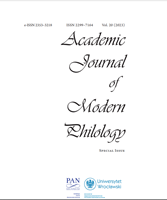L’analyse du contexte comme outil didactique efficace dans la compréhension de la différence d’emploi du passé composé imperfectif et passé composé perfectif par les apprenants slaves
Context Analysis as an Effective Didactic Tool in the Understanding of the Difference in the Use of the Passé Composé Perfectif and Passé Composé Imperfectif by Slavic-speaking Learners
Author(s): Zuzana PuchovskáSubject(s): Foreign languages learning, Language acquisition, Western Slavic Languages
Published by: Komisja Nauk Filologicznych Oddziału Polskiej Akademii Nauk we Wrocławiu
Keywords: passé composé; contextual analysis; achèvement; accomplissement; verbal aspect; corpus;
Summary/Abstract: The author focuses on the topic of the passé composé and the expression of the verbal aspect in the French language and in the Slovak and Polish languages. She examines the potential of contextual analysis of the passé composé in the perception of the difference between what she calls the passé composé perfectif and the passé composé imperfectif. From the contrastive perspective of the French language versus the two Slavic languages, she examines the notions of achèvement and accomplissement linked to the aspectual interpretation of the passé composé and finds that only the intra-phrastic context of the passé composé enables learners to better master the dual use of this tense in French. The author bases her argument on the corpora of minimal sentences from which the teacher and the learners of the French language can establish the contextual elements allowing to differentiate between the two uses in question.
Journal: Academic Journal of Modern Philology
- Issue Year: 2023
- Issue No: 20
- Page Range: 155-166
- Page Count: 12
- Language: French

